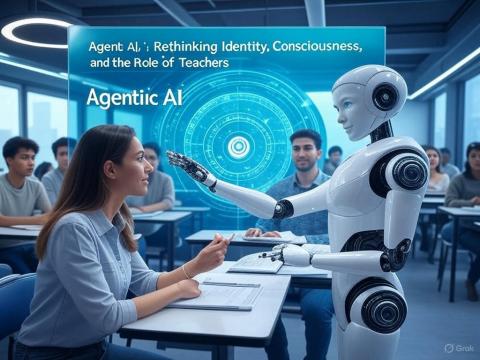
Agentic AI: Rethinking Identity, Consciousness, and the Role of Teachers
In the AI age, machines are getting agency. This is the first time that a non-biological entity has gained agency. AI-enabled chatbots can think, analyze, interpret, and make decisions. This is what it means when we refer to them gaining agency. In agentic terms, now humans and AI are equals; rather, AI is more capable. The only difference lies in the matter of consciousness—the domain which we are yet to understand and decipher. Neuroscientists are working in this area, and we may develop an understanding of consciousness very soon. Or, the agentic AI might find a way to gain consciousness—a possibility that cannot be ruled out.
What is the implication of agentic AI? There is no doubt that it will make life convenient for some and challenging for a large number of people. It can also compete with humans, and a handful of humans with control of the agentic AI will truly exercise power like the superhuman that Nietzsche visualised a century ago in his book Thus Spoke Zarathustra.
Suppose it creates great convenience in living, yet the question is: is gaining convenience the ultimate pursuit that we are interested in? Or is meaningful engagement something that we crave? Most meaningful engagement gets created through intersubjective interaction. Would that be possible when we are working with agentic AI?
Let’s take the example from the classroom. What a teacher talks about can easily be replaced by agentic AI. At the surface level, the agentic AI may appear to do better than teachers, but what about those intersubjective conversations that teachers and children undertake during the course of teaching and learning? For example, if a child wrote something good and gets applauded by the teacher through a sentence, “You wrote really well,” the teacher may also pat the back of the student while saying this. The look-alike AI teacher can also do it; rather, it can say better words with great emotional intensity and can also develop a smooth touch. But the question is: do these words matter, or does who said them matter the most? Can agentic AI be the who?
How do we construct the who or the identity that we have? Human identity is the construct of intersubjective reality. It’s in the context of a school that we identify a teacher and a student; outside this context, the same person has another identity. Would it be possible to create a context where agentic AI gets this intersubjective reality? Most of the things we value are matters of intersubjective reality. Our notions of good/bad, success/failure, and so on are all constructs of intersubjective reality. In other words, there is a group of people who have agreed to believe in a common notion or concept. This intersubjective reality differs from one community to another. Intersubjective realities may not be truth, but they hold immense value for the members of the community and give meaning to their activities.
There is a possibility that the interaction between humans and AI will intensify further, and we may find them all around us. But still, the question remains the same: how would we construct meaning? Can one participate in an intersubjective meaning-making process without being conscious?
All places which shape identity will continue to hold importance unless we find ways of meaning-making with agentic AI. In this context, schools and colleges hold an important place. In terms of delivery of content and skill training, the agentic AI will do far better work, but this cannot shape the identity of students. We still need teachers with whom they engage in the intersubjective meaning-making process that ultimately shapes the identity of the children.
Teachers too need to identify their core function: they shape identity. They need to identify new frontiers of interaction with children, and of course, they should deploy AI power to facilitate all the unnecessary work that they were engaged in doing. This is the time when teachers engage in real conversations with children around the lived experiences of children, which otherwise we have dropped from our syllabus. The understanding of the intersubjective reality holds the fort that humans constructed through the process of development, and all places which construct it will continue to be valuable.
- Log in to post comments
